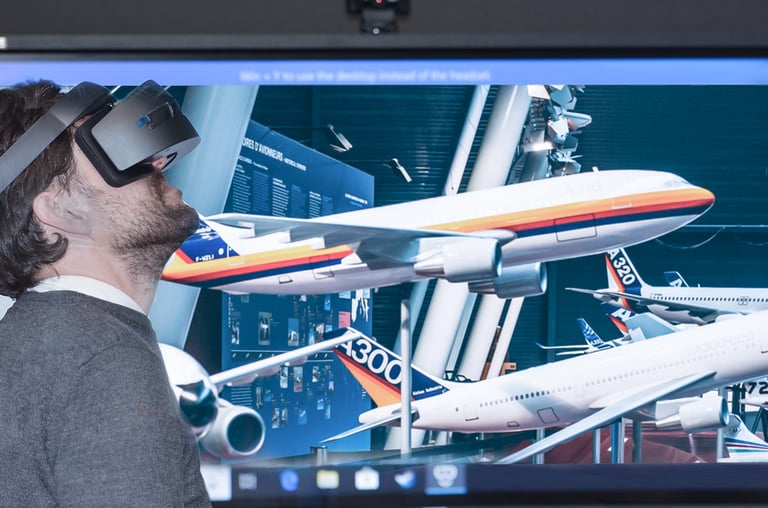Peplink, alongside certified partner Vitel GmbH, ultilized cutting-edge products and SpeedFusion technologies to deliver the first ever augmented reality experience for an aviation museum in Europe. Due to Peplink’s high-bandwidth bonded connection with low latency, visitors were able to remotely immerse themselves in the tour and explore every nook and crevice of the museum.
A European aviation museum wished to create and test an immersive tour for visitors who wished to visit from a remote location. In an age where social distancing has been encouraged, this could not have come at a better time.
To make the experience as realistic as possible, real time streaming with no delay was imperative. Such bandwidth-intensive applications can only be operated with an uninterrupted 5G connection. As the 360° cameras were predicted to produce a lot of traffic, low latency was important in ensuring a stable upload speed. Therefore, Peplink’s dual-cellular router was perfect for such a deployment, due to its capability to have two 5G connections.

With the intention of mimicking a guided tour, 360° cameras and 180° beamers were set up to ensure the application could be as immersive as possible. After completion, visitors were able to view the museum exhibits from the AR app in every motion from every angle. Viewing could also be made through AR glasses or a desktop monitor.
Having two 5G connections was particularly important, as the speeds were needed to ensure the tour of the aviation museum was as interactive and engaging as possible. The redundant SIM slots in the routers were perfect in ensuring a back-up connection was available if the first link were to drop. This ensures the complete tour of the museum can be enjoyed without interruptions.
Preparing for the Future
In a recent webinar addressing how this use case made the most of 5G, Nadir Yilmaz, Managing Director of industrial networking distributor Vitel GmbH, explains how we are entering the next stage of internet connectivity, and believes that now is the time to prepare for this change.
Yilmaz believes the demand for 5G will only increase, particularly in times such as the pandemic where possibilities of face-to-face contact was limited. He asserts that these opportunities are likely to arise in all different industry sectors. These cases can range from educational training classes, orchestras and concerts, to surveillance operations and remote maintenance support.
“The possibilities of 5G makes this case a really good and usable application, especially having a device like Peplink’s where you can bond several 5G connections. I haven’t seen this performance rate from other vendors. I would strongly advise anyone who hasn’t done it yet to get prepared, because there are many more applications coming up and therefore also many more opportunities for all of us.”
Nadir Yilmaz, Managing Director of Vitel GmbH
“There are many use cases,” Yilmaz expressed. “Classrooms, training, and business conferences that can stream the conference in the room while having other participants present with a bi-directional connection where everyone can talk to each other.”
As the world shifts towards an era of automation, the need for 5G has never been more critical. In order to make the impossible possible and deliver such ambition, a strong, unbreakable 5G connection is needed for these types of applications. However, one 5G connection may not be enough, as once the connection breaks, the signal is interrupted. In mission-critical applications, this signal interruption can be life-threatening.
The Power of Peplink’s 5G Products
Our products and patented SpeedFusion bandwidth bonding technology is suited for such deployments. The bandwidth bonding technology combines the bandwidth of multiple available internet connections to create one mega-bandwidth channel, delivering a connection speed unlike no other. In the unlikely scenario of a connection breaking, the redundant SIM slots can provide a back-up connection to ensure no signal interruptions occur.
“With Peplink, you get the possibility of a really high performance bonding through several 5G connections,” explained Yilmaz. “Peplink’s MBX Mini product can go up to 600 Megabits in bonding performance, providing you with several 5G links, which you can use with different vendors.”
“Peplink’s X-series products have a very good CPU unit, which also gives you a very low latency on top as well. High bandwidth and low latency are the critical criterias, on top of having an unbreakable connection where if one line should fail, the other will still maintain that without packet loss. These are the unique features.”

